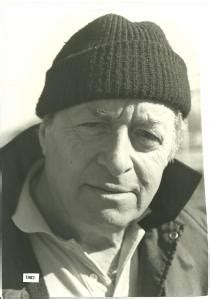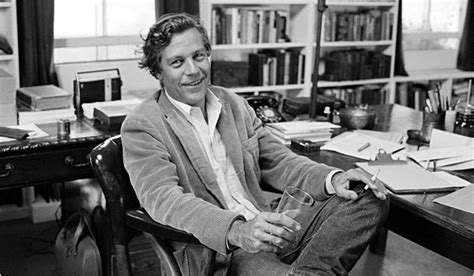A Quote by Ernest Hemingway
Organizations for writers palliate the writer's loneliness, but I doubt if they improve his writing.... For he does his work alone and if he is a good enough writer he must face eternity, or the lack of it, each day.
Related Quotes
If a writer of prose knows enough about what he is writing about he may omit things that he knows and the reader, if the writer is writing truly enough, will have a feeling of those things as strongly as though the writer had stated them. The dignity of movement of an iceberg is due to only one-eighth of it being above water. A writer who omits things because he does not know them only makes hollow places in his writing.
The writer learns to write, in the last resort, only by writing. He must get words onto paper even if he is dissatisfied with them. A young writer must cross many psychological barriers to acquire confidence in his capacity to produce good work-especially his first full-length book-and he cannot do this by staring at a piece of blank paper, searching for the perfect sentence.
The writer walks out of his workroom in a daze. He wants a drink. He needs it. It happens to be a fact that nearly every writer of fiction in the world drinks more whisky than is good for him. He does it to give himself faith hope and courage. A person is a fool to become a writer. His only compensation is absolute freedom. He has no master except his own soul and that I am sure is why he does it.
It feels as though a very disproportionate number of main characters are writers, because that's what the writer knows. Fair enough. But nothing bothers me more in a movie than an actor playing a writer, and you just know he's not a writer. Writers recognize other writers. Ethan Hawke is too hot to be a writer.
Unless a writer lives with a periodic delusion of his greatness, he will not continue writing. He must believe, against all reason and evidence, that the public will experience a catastrophic loss if he does not complete his novel. The public is just clamoring to give him his fame. From the book Dare to be a Great Writer: 329 Keys to Powerful Fiction by
That's one thing I like about Hollywood. The writer is there revealed in his ultimate corruption. He asks no praise, because his praise comes to him in the form of a salary check. In Hollywood the average writer is not young, not honest, not brave, and a bit overdressed. But he is darn good company, which book writers as a rule are not. He is better than what he writes. Most book writers are not as good.
Entertain, yes. That goes without saying. But a good writer does that automatically, it's built into the machine. Telling a thumpingly good, mesmerizing story is what one does without question. But beyond that, any writer worth his/her hire knows that all writing, one way or another, is subversive. It is guerrilla warfare against the status quo.
I do not believe that it is necessarily the duty of the writer to give a voice to his community. If a writer is true to his vocation, to his or her vocation, the very process of creativity enlarges these human horizons. It provides insights, even when you're not writing, when your writing's not dealing with a concrete political situation.
Writing itself, if not misunderstood and abused, becomes a way of empowering the writing self. It converts anger and disappointment into deliberate and durable aggression, the writer's main source of energy. It converts sorrow and self-pity into empathy, the writer's main means of relating to otherness. Similarly, his wounded innocence turns into irony, his silliness into wit, his guilt into judgment, his oddness into originality, his perverseness into his stinger.
All nonfiction writers, whether they like it or not, are translators. The translator is the perfect journalist. The best journalism endeavors to convey an essential idea or story to an audience that knows very little about it, and that requires translation. To do this successfully, the writer must filter the idea through the prism of his eye, and his mind, and his writing style.
The nightmare of censorship has always cast a shadow over my thoughts. Both under the previous state and under the Islamic state, I have said again and again that, when there is an apparatus for censorship that filters all writing, an apparatus comes into being in every writer's mind that says: "Don't write this, they won't allow it to be published." But the true writer must ignore these murmurings. The true writer must write. In the end, it will be published one day, on the condition that the writer writes the truth and does not dissemble.
If you're going to be a writer you should sit down and write in the morning, and keep it up all day, every day. Charles Bukowski, no matter how drunk he got the night before or no matter how hungover he was, the next morning he was at his typewriter. Every morning. Holidays, too. He'd have a bottle of whiskey with him to wake up with, and that's what he believed. That's the way you became a writer: by writing. When you weren't writing, you weren't a writer.





































